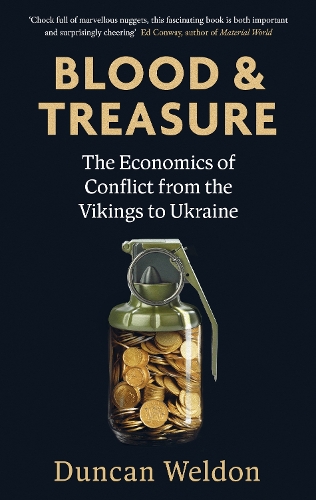
Blood and Treasure: The Economics of Conflict from the Vikings to Ukraine
(Hardback)
Available Formats
Publishing Details
Blood and Treasure: The Economics of Conflict from the Vikings to Ukraine
By (Author) Duncan Weldon
Little, Brown Book Group
Abacus
9th September 2025
5th June 2025
United Kingdom
Classifications
Tertiary Education
Non Fiction
330
Physical Properties
Hardback
320
Width 158mm, Height 240mm, Spine 30mm
543g
Description
Blood and Treasure is the story of the economics of conflict from the Viking Age to the war in Ukraine.
'A brilliant book' MARTIN WOLF, FINANCIAL TIMES CHIEF ECONOMICS EDITOR'Chock full of marvellous nuggets, this fascinating book is both important and surprisingly cheering' ED CONWAY, author of Material WorldWars are expensive, both in human terms and monetary ones. But while warfare might be costly it has also, at times, been an important driver of economic change and progress. Over the long span of history nothing has shaped human institutions - and thus the process of economic development - as much as war and violence. Wars made states and states made wars. As the costs of warfighting grew so did state structures, taxation systems and national markets for debt. And as warfare became ever more destructive the incentive for governments to resort to it changed too. Blood and Treasure looks at the history and economics of warfare from the Viking Age to the war in Ukraine, examining how incentives and institutions have changed over time. It surveys how warfare may have driven Europe's rise to global prominence, and it explains how the total wars of the twentieth century required a new type of strategy, one that took economics seriously. Along the way it asks whether Genghis Khan should be regarded as the father of globalisation, explains how New World gold and silver kept Spain poor, ponders why some economists think of witch trials as a form of 'non-price competition', notes how pirate captains were pioneers of effective HR techniques, asks if handing out medals hurt the Luftwaffe in the Second World War and assesses if economic theories helped to create a tragedy in Vietnam. As well as considering why some medieval kings were right to arm their soldiers with inferior weapons, taking some management lessons from Joseph Stalin and asking if a culture of patronage and cronyism helped the Royal Navy rise to greatness.Underpinning it all is a focus on how and why the economics of conflict have changed over time. Economics can help to explain war and understanding the history of warfare can help explain modern economics.Reviews
War and wealth, or 'blood and treasure', are intimately connected. Thus, war is also an economic activity: it has economic motivations, demands economic resources and has economic consequences. But, over time, as Duncan Weldon explains in this brilliant book, those motivations, resources and consequences have changed. That evolution is not just the result of political and economic developments, but also a leading cause of them. The good news is that the economic gains from major wars have collapsed as the costs have soared. The bad news is even this may not be enough to curb humanity's horrifying propensity for mass conflict. * Martin Wolf, Financial Times Chief Economics Editor *
Chock full of marvellous nuggets, this fascinating book is both important and surprisingly cheering. As the world creeps towards war, we all need to understand the economics behind conflict. But, as this book so brilliantly shows, sometimes it takes war itself to teach us the most profound economic lessons about ourselves * Ed Conway, author of Material World *
This is an absolutely fascinating and totally absorbing book and one that could not be more prescient. Weldon masterfully underscores the historical and ongoing - yet complex - connections between wars, economic development and institutional evolution. Full of wisdom and rich in depth and detail, this does much to further our understanding of the troubled world in which we live today. Brilliant * James Holland *
Author Bio
Duncan Weldon is a writer and broadcaster. As a journalist he has previously covered the British and global economies at The Economist and the BBC as well as writing and presenting radio documentaries. An economist by background, he began his career at the Bank of England, before working in asset management and public policy. He is a member of the advisory board of the Centre for the Analysis of Comparative Advantage in the Global Economy at Warwick University. He is also a regular commentator on television and radio and writes for a variety of publications. His first book, Two Hundred Years of Muddling Through, was published in 2021.
